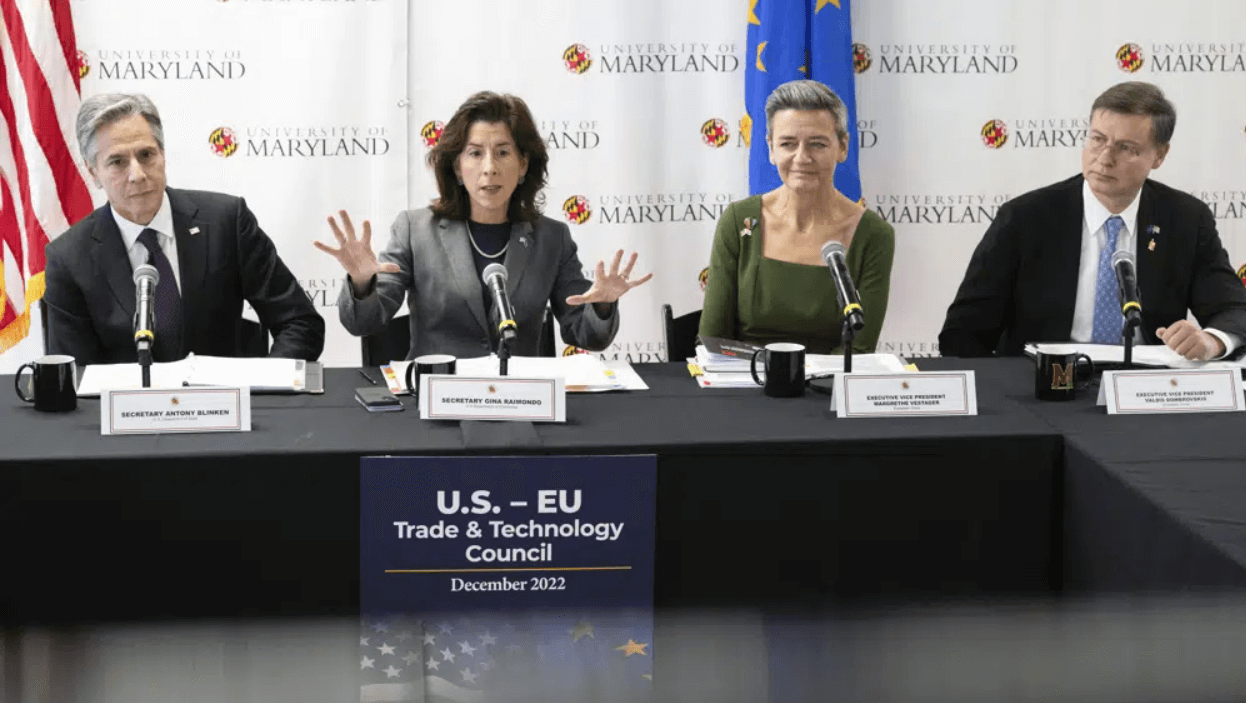During the third ministerial Trade and Technology Council (TTC) talks on Monday, the United States (US) and the European Union (EU) failed to resolve the dispute related to the Inflation Reduction Act (IRA) but took stock of the progress made by the US-EU Task Force to address both sides’ concerns.
In a joint statement, they said, “We acknowledge the EU’s concerns and underline our commitment to address them constructively.”
At the TTC working lunch, we discussed the Inflation Reduction Act. The United States and Europe can create good paying jobs and tackle the climate crisis — and not at each other’s expense.
— Secretary Antony Blinken (@SecBlinken) December 5, 2022
Similarly, US Secretary of State Antony Blinken emphasised, “We’ve heard concerns clearly from our European friends about certain specific aspects of the legislation,” adding that the task force is working “efficiently” and “quickly” and admitted that the meeting had “advanced that discussion” regarding electric and commercial vehicle tax credit.
“I’m convinced that we are continuing to give momentum to that conversation and to working through the differences as President Biden said we would do,” he stressed.
European Commission Executive Vice President Margrethe Vestager, too, acknowledged that it “is really helpful to show that there is a real concern where there are an analysis that shows that there is a potential fallout of the Inflation Reduction Act on the European industrial base.”
Just wrapped up the EU-US Trade & Technology Council #TTC meeting in @UofMaryland More here 👉 https://t.co/QMjZ8IIF4q pic.twitter.com/LvGvGLx4fz
— Margrethe Vestager (@vestager) December 5, 2022
Likewise, EU Commissioner for Trade Valdis Dombrovskis noted the “talk about friendshoring and cooperation,” saying, “Today we are leaving this meeting slightly more optimistic than we were entering this meeting.”
However, he also pointed out that a lot of work remains incomplete, since many provisions were already enforced while some would come into play by 1 January. Nevertheless, he expressed hope that the joint task force will be able to “deliver concrete results still this year.”
Before the meeting, Dombrovskis spoke about how the IRA is unfair to the bloc’s industry, as it gave $7,500 in tax credits for buying new US-made electric vehicles, which he opined would hurt the European market considerably.
“With all our discussions, we are in a sense making a step forward, but with the Inflation Reduction Act, we’re making two steps backwards, so we need to reconcile it,” he told DW.
We today moved the needle on the Inflation Reduction Act.
— Valdis Dombrovskis (@VDombrovskis) December 5, 2022
We now need to go from engagement from the U.S. to commitments - and see results before the end of the year.
We should seize the opportunities to work together on climate change. pic.twitter.com/E7mz9r51cp
During a meeting with his American counterpart Joe Biden, French President Emmanuel Macron reiterated the bloc’s concerns about the Act and told US lawmakers prior to his meeting with Biden that the IRA heavily favours US climate technology.
Similarly, following a meeting with his German counterpart Robert Habeck last Tuesday, French Economy Minister Bruno Le Maire threatened to establish a “buy European act” to firmly retaliate against the IRA.
“When we look at the IRA, the status quo is unthinkable, a trade war would be irresponsible,” Le Maire stated, adding, “Europe has to defend its interests as a priority.”
With the press point of the Principals, 🇪🇺🇺🇸 #TTC comes to a successful close. Digital partnerships w/ Jamaica, Kenya ➡️ open, secure, rights-based internet; Russian aggression; China/non-market practices; transatlantic+ supply chains; AI standards; IRA; more. #StrongerTogether. pic.twitter.com/BIvoi9bAq4
— Ambassador Stavros Lambrinidis 🇪🇺 (@EUAmbUS) December 5, 2022
European and South Korean automobile companies, which sell millions of cars in the US, have warned the US that they could file complaints at the World Trade Organization regarding the Act. However, Congress is unwilling to repeal the bill.
The IRA aims to reduce carbon emissions by almost 40% by 2030 and has been touted as the “greatest pro-climate legislation that has ever been passed by Congress.” According to a brief summary of the legislation, about $369 billion would be set aside for energy security initiatives and to combat the climate crisis.
In short:
— EU Trade 🇪🇺 (@Trade_EU) December 5, 2022
The TTC cuts unnecessary red tape.
The TTC boosts trade between the EU and the US.
The TTC works.https://t.co/1Dg9IdLTLg pic.twitter.com/8HGVm5iHsR
Meanwhile, the TTC also launched new cooperation with Jamaica and Kenya, which participated in the discussions virtually, on digital connectivity. They discussed how Washington and Brussels “can better engage third countries to promote secure digital infrastructure.”
Both parties also issued a Joint Artificial Intelligence Roadmap, discussed building and advancing the development of resilient supply chains, especially for semiconductors, and opportunities for cooperation on digital policy and technology standards.

